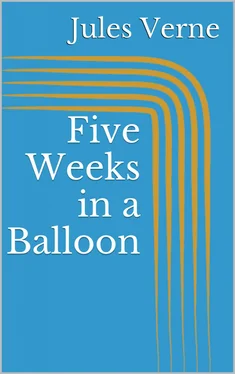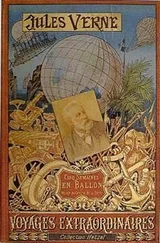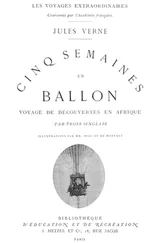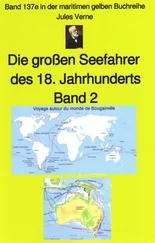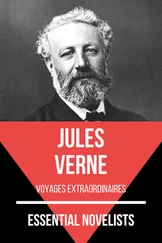On the 16th of February, the Resolute cast anchor near Greenwich. She was a screw propeller of eight hundred tons, a fast sailer, and the very vessel that had been sent out to the polar regions, to revictual the last expedition of Sir James Ross. Her commander, Captain Bennet, had the name of being a very amiable person, and he took a particular interest in the doctor's expedition, having been one of that gentleman's admirers for a long time. Bennet was rather a man of science than a man of war, which did not, however, prevent his vessel from carrying four carronades, that had never hurt any body, to be sure, but had performed the most pacific duty in the world.
The hold of the Resolute was so arranged as to find a stowing-place for the balloon. The latter was shipped with the greatest precaution on the 18th of February, and was then carefully deposited at the bottom of the vessel in such a way as to prevent accident. The car and its accessories, the anchors, the cords, the supplies, the water-tanks, which were to be filled on arriving, all were embarked and put away under Ferguson's own eyes.
Ten tons of sulphuric acid and ten tons of iron filings, were put on board for the future production of the hydrogen gas. The quantity was more than enough, but it was well to be provided against accident. The apparatus to be employed in manufacturing the gas, including some thirty empty casks, was also stowed away in the hold.
These various preparations were terminated on the 18th of February, in the evening. Two state-rooms, comfortably fitted up, were ready for the reception of Dr. Ferguson and his friend Kennedy. The latter, all the while swearing that he would not go, went on board with a regular arsenal of hunting weapons, among which were two double-barrelled breech-loading fowling-pieces, and a rifle that had withstood every test, of the make of Purdey, Moore & Dickson, at Edinburgh. With such a weapon a marksman would find no difficulty in lodging a bullet in the eye of a chamois at the distance of two thousand paces. Along with these implements, he had two of Colt's six-shooters, for unforeseen emergencies. His powder-case, his cartridge-pouch, his lead, and his bullets, did not exceed a certain weight prescribed by the doctor.
The three travellers got themselves to rights on board during the working-hours of February 19th. They were received with much distinction by the captain and his officers, the doctor continuing as reserved as ever, and thinking of nothing but his expedition. Dick seemed a good deal moved, but was unwilling to betray it; while Joe was fairly dancing and breaking out in laughable remarks. The worthy fellow soon became the jester and merry-andrew of the boatswain's mess, where a berth had been kept for him.
On the 20th, a grand farewell dinner was given to Dr. Ferguson and Kennedy by the Royal Geographical Society. Commander Bennet and his officers were present at the entertainment, which was signalized by copious libations and numerous toasts. Healths were drunk, in sufficient abundance to guarantee all the guests a lifetime of centuries. Sir Francis M——presided, with restrained but dignified feeling.
To his own supreme confusion, Dick Kennedy came in for a large share in the jovial felicitations of the night. After having drunk to the "intrepid Ferguson, the glory of England," they had to drink to "the no less courageous Kennedy, his daring companion."
Dick blushed a good deal, and that passed for modesty; whereupon the applause redoubled, and Dick blushed again.
A message from the Queen arrived while they were at dessert. Her Majesty offered her compliments to the two travellers, and expressed her wishes for their safe and successful journey. This, of course, rendered imperative fresh toasts to "Her most gracious Majesty."
At midnight, after touching farewells and warm shaking of hands, the guests separated.
The boats of the Resolute were in waiting at the stairs of Westminster Bridge. The captain leaped in, accompanied by his officers and passengers, and the rapid current of the Thames, aiding the strong arms of the rowers, bore them swiftly to Greenwich. In an hour's time all were asleep on board.
The next morning, February 21st, at three o'clock, the furnaces began to roar; at five, the anchors were weighed, and the Resolute, powerfully driven by her screw, began to plough the water toward the mouth of the Thames.
It is needless to say that the topic of conversation with every one on board was Dr. Ferguson's enterprise. Seeing and hearing the doctor soon inspired everybody with such confidence that, in a very short time, there was no one, excepting the incredulous Scotchman, on the steamer who had the least doubt of the perfect feasibility and success of the expedition.
During the long, unoccupied hours of the voyage, the doctor held regular sittings, with lectures on geographical science, in the officers' mess-room. These young men felt an intense interest in the discoveries made during the last forty years in Africa; and the doctor related to them the explorations of Barth, Burton, Speke, and Grant, and depicted the wonders of this vast, mysterious country, now thrown open on all sides to the investigations of science. On the north, the young Duveyrier was exploring Sahara, and bringing the chiefs of the Touaregs to Paris. Under the inspiration of the French Government, two expeditions were preparing, which, descending from the north, and coming from the west, would cross each other at Timbuctoo. In the south, the indefatigable Livingstone was still advancing toward the equator; and, since March, 1862, he had, in company with Mackenzie, ascended the river Rovoonia. The nineteenth century would, assuredly, not pass, contended the doctor, without Africa having been compelled to surrender the secrets she has kept locked up in her bosom for six thousand years.
But the interest of Dr. Ferguson's hearers was excited to the highest pitch when he made known to them, in detail, the preparations for his own journey. They took pleasure in verifying his calculations; they discussed them; and the doctor frankly took part in the discussion.
As a general thing, they were surprised at the limited quantity of provision that he took with him; and one day one of the officers questioned him on that subject.
"That peculiar point astonishes you, does it?" said Ferguson.
"It does, indeed."
"But how long do you think my trip is going to last? Whole months? If so, you are greatly mistaken. Were it to be a long one, we should be lost; we should never get back. But you must know that the distance from Zanzibar to the coast of Senegal is only thirty-five hundred—say four thousand miles. Well, at the rate of two hundred and forty miles every twelve hours, which does not come near the rapidity of our railroad trains, by travelling day and night, it would take only seven days to cross Africa!"
"But then you could see nothing, make no geographical observations, or reconnoitre the face of the country."
"Ah!" replied the doctor, "if I am master of my balloon—if I can ascend and descend at will, I shall stop when I please, especially when too violent currents of air threaten to carry me out of my way with them."
"And you will encounter such," said Captain Bennet. "There are tornadoes that sweep at the rate of more than two hundred and forty miles per hour."
"You see, then, that with such speed as that, we could cross Africa in twelve hours. One would rise at Zanzibar, and go to bed at St. Louis!"
"But," rejoined the officer, "could any balloon withstand the wear and tear of such velocity?"
"It has happened before," replied Ferguson.
"And the balloon withstood it?"
"Perfectly well. It was at the time of the coronation of Napoleon, in 1804. The aeronaut, Gernerin, sent up a balloon at Paris, about eleven o'clock in the evening. It bore the following inscription, in letters of gold: 'Paris, 25 Frimaire; year XIII; Coronation of the Emperor Napoleon by his Holiness, Pius VII.' On the next morning, the inhabitants of Rome saw the same balloon soaring above the Vatican, whence it crossed the Campagna, and finally fluttered down into the lake of Bracciano. So you see, gentlemen, that a balloon can resist such velocities."
Читать дальше
